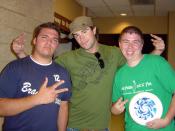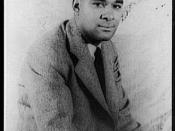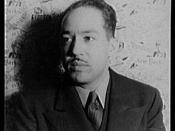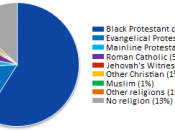The autobiography Black Boy, written by Richard Wright is a powerful collection of stories on the treatment of African-Americans in the South during the early 20th century. Wright was a pioneer during the Harlem Renaissance, and Black Boy was one of his most important contributions to the movement. The excerpt The Library Card is perhaps the strongest statement on the treatment of African-Americans in the whole work. There are many themes in the excerpt which Wright has included to complement the overall picture of the work. However the most prevalent and powerful theme is that of oppression of the entire African-American people.
The theme of oppression begins quite early in the excerpt. On the first page Wright goes into a bank lobby to read a newspaper, where he finds a scathing denunciation of H.L. Mencken, a man who disliked much of the American culture, while he thought very highly of European culture.
This inspires Wright to think about how to get some of his books, and he remembers that there is a man whom he worked with who was not "anti-negro"ÃÂ and decides to ask if he can use the man's library card to check out some books. Yet, even in his own way, this man is oppressive of African-Americans, ""ÃÂIt's good of you to want read,' he said. "ÃÂBut you ought to read the right things'"ÃÂ (165). This sort of treatment is throughout the book when people think that African-Americans who do read should only read simple, non-intellectual books. However, this man, Mr. Falk, does enable Wright to check out some books by giving Wright his library card, and instead using his wife's card. However, Wright still has to demean himself in order to get any books. A prime example is shown in the excerpt.
"I finally thought what I thought would be a foolproof note: Dear Madam: Will you please let this nigger boy"ÃÂI used the word "ÃÂnigger' to make the librarian feel I could not possibly be the author of the note"ÃÂhave some books by H. L. Mencken? I forged the white man's name"ÃÂ (165).
However, this is not the only cost of the oppression that Wright went through. As his experience continues and he borrows more books, he becomes aware to the intellectual oppression of which he has always been ignorant.
As Wright learned more about the world about him through the books he was reading, he also discovered that many of the things he used to believe were actually true.
"In buoying me up, reading also cast me down, made me see what was possible, what I had missed. My tension returned, new, terrible, bitter, surging, almost too great to be contained. I no longer felt that the world about me was hostile, killing; I knew it. A million times I asked myself what I could do to save myself, and there were no answers. I seemed forever condemned, ringed by walls"ÃÂ (169).
Later his family comes to live with him, and they try to save up enough money to go to the North. It is during this time that Wright gauges his chances of continuing to live peacefully in the South, and he realizes that he will never be able to again, and that he must move up North.
The effect of the reading upon Wright was great. He was much happier due to it, yet his innocence was revoked, he was oppressed, by his newfound knowledge and realization. After he had read for some time, he began to write on the racial experiences of his people in the South, and discrimination and exploitation during the Depression. His essays and stories about the oppression of African-Americans helped fuel the Harlem Renaissance, and make him one of the most influential writers of the movement.





